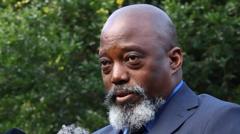In a significant political upheaval, the DR Congo government has banned Joseph Kabila's party, the People's Party for Reconstruction and Democracy (PPRD), citing its perceived links to the beleaguered M23 rebel faction. The ban coincides with Kabila's recent return to the country after a two-year absence, which has sparked controversy and opposition claims of high treason against him. The accusations originate from the Interior Ministry's statement regarding the party's ambivalent response to the armed conflict in eastern Congo.
**DR Congo Government Accuses Joseph Kabila's Party of Rebel Associations**

**DR Congo Government Accuses Joseph Kabila's Party of Rebel Associations**
The Democratic Republic of Congo has officially dissolved the political party of former President Joseph Kabila amid allegations of connections to the M23 rebel group.
Kabila's return to the conflict-ridden town of Goma, now under M23 control, has raised concerns about his intentions and potential involvement with the rebels. The government has seized Kabila's assets and accused him of complicity in treason, while he has denied any ties to the M23, remaining largely silent on the government's actions. His representatives maintain that he is not in Goma, although Kabila himself hinted at a national address that might clarify his stance.
This political turmoil highlights the ongoing challenges in a country grappling with the repercussions of civil unrest, historical rivalries, and foreign intervention, shedding light on DR Congo's complex geopolitical landscape.
As tensions grow, observers note that Kabila's past connections and the historical context surrounding his family legacy evoke skepticism among the populace. The landscape of Congolese politics remains fraught with volatility, reiterating the necessity for clear leadership as the country navigates its security crisis.
The latest developments could signal a critical moment in DR Congo's political future, underlining the crucial intersections between governance, rebellion, and the enduring impact of past leadership on current events.
---
The Democratic Republic of Congo faces a political crisis as former President Joseph Kabila’s party is banned amid allegations of ties to the M23 rebel group, raising questions about his return and intentions.
This political turmoil highlights the ongoing challenges in a country grappling with the repercussions of civil unrest, historical rivalries, and foreign intervention, shedding light on DR Congo's complex geopolitical landscape.
As tensions grow, observers note that Kabila's past connections and the historical context surrounding his family legacy evoke skepticism among the populace. The landscape of Congolese politics remains fraught with volatility, reiterating the necessity for clear leadership as the country navigates its security crisis.
The latest developments could signal a critical moment in DR Congo's political future, underlining the crucial intersections between governance, rebellion, and the enduring impact of past leadership on current events.
---
The Democratic Republic of Congo faces a political crisis as former President Joseph Kabila’s party is banned amid allegations of ties to the M23 rebel group, raising questions about his return and intentions.





















